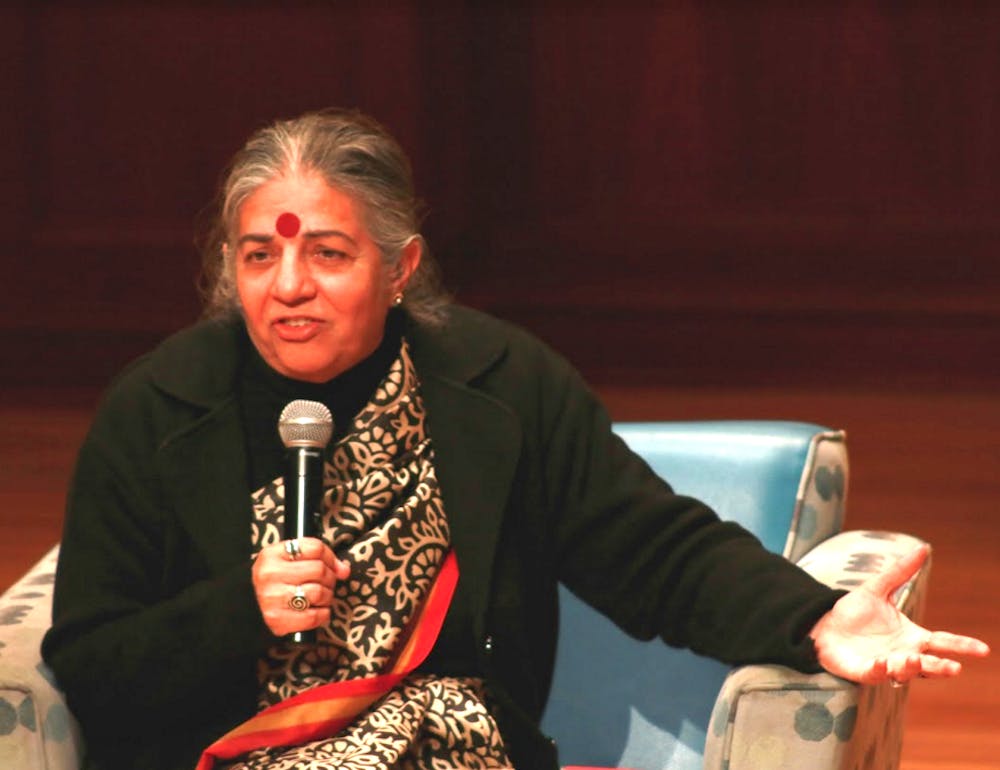By Karina Pedraza and James Loewen
Staff Writer and Correspondent
Internationally known scientist and activist Vandana Shiva came to the College on Thursday, April 12 to hold three lectures from 11 a.m. to 6:20 p.m. in the Education Building Room 212 and the Mayo Concert Hall. The lectures focused around a central theme of “Who We Are,” but addressed the question in terms of economics, politics and food systems.
Shiva, who has published more than 20 books, founded Navdanya, an organization based in India with the goal of creating and fostering sustainable communities by promoting renewable and organic agricultural practices. In addition to founding Navdanya, Shiva’s work includes advising organizations and governments worldwide.
Her first lecture addressed the topic, “Biotechnology and Food Justice: The Case of GMOs.”
Shiva discussed the importance of adopting a more ecological mindset by opposing the use of genetically modified organisms. She argued that people should strive for true food security, and believes people should engage in conversations with those who produce our food about both the quality of food and sustainable practices.
Shiva was then joined by Leeann Thornton, a professor of biology at the College, who shared similar sentiments about food justice and how people have a right to know about what they eat, sell and grow.

Though Thornton acknowledged the benefits of GMOs due to their ability to feed large quantities of people, she also believes that people must shift the framework of how they view the nutritional benefits of food.
Shiva has been personally shaped by the Green Revolution, which substantially affected her home country of India. The Green Revolution occurred in the 1960s and 1970s due to the introduction of genetically modified wheat and rice, which she claimed led to an abundance of nutritionally empty food.
Shiva warned against the reductionist way of thinking that measures food quantity in relation to labor output. This, in turn, forces food producers to focus more on the quantity of the food as opposed to ecological concerns and nutritional value.
“Those who are the producers of food are in the crisis of food themselves,” she said.
Shiva also talked about “Earth Democracy: New Jersey and the World,” a community dialogue between the College community and the surrounding area.
Although Shiva’s background is in quantum physics, she said she focused her efforts on environmental activism when she noticed the environmental damage that her home region in India was suffering from.
The overlap between quantum theory and ecological mindfulness is interconnectivity, according to Shiva.
“Mechanistic thought is ‘everything is separate,’” Shiva said. “Quantum thought is ‘everything is related — it’s non-separable.’ Ecological thought is, ‘it’s all interconnected.’”
The primary issue in agriculture today, as Shiva sees it, is global corporate oversight and control.
“Rules (are) written by corporations,” Shiva said. “Monsanto was writing the intellectual property rules. Cargill was writing the agriculture rules. The Nestles and the Cokes were writing the sanitary and phytosanitary health safety rules. So, these were corporate rules written for the expansion of their markets and control.”
Shiva advocates for smaller, local agricultural initiatives that are not focused on economic and capitalistic gain, but rather on the health and development of local communities.
An example of this brand of farming is a community-supported agriculture.
Farmers and volunteers from Fernbrook Farm, a CSA located just south of the College in Chesterfield, New Jersey, came to discuss their agricultural beliefs with Shiva.
“I think the main thing is diversity,” said Jeff Tober, farm manager of Fernbrook Farm. “The diversity in what we grow, diversity in the families that are a part of our farm … diversity of our crew, we’ve had 30 apprentices over the last 10 years … they’re the lifeblood of our farm, young people.”
Shiva and Tober’s belief that agriculture should be a community-centric enterprise is not inherently at odds with the idea of an interconnected global society.
“There are two ways you can think of globalization,” Shiva said. “One is the globalization of the global corporations, but the other globalization is the globalization of the local … we must learn from every culture that can teach us good practice.”
After exploring these issues on an ideological level, the conversation shifted to a more pragmatic and immediate view. In light of the 2018 campus-wide theme “Who We Are,” the question then shifted to, “What can we do?”
Jessica Hwang, a junior biology and public health double major, expressed some of the common issues symptomatic of the college experience.
“As students, we tend to forget and we get lost in eating at the dining hall and eating fast food,” Hwang said. “There are not a lot of resources around campus, but I always forget we live in New Jersey. There are CSA’s like 10 minutes away from us and we have amazing opportunities for people like Vandana Shiva to come and speak to us.”
For farmers and producers, Shiva recommends a change in focus. The path to fixing our planet’s agriculture, according to Shiva, starts by changing our fundamental understanding of the foods we produce and cultivate.
“We’re not growing food,” Shiva said. “We’re growing your health. We are health providers.”







